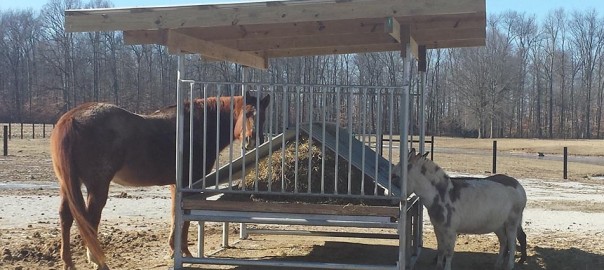

When it comes to hay waste, using the right type of hay feeder can make a significant difference in saving hay, money and time. That’s why it’s important to understand all of the positive benefits that come along with using hay saver feeders.
Confining hay within a feeder helps to eliminate waste by nearly 40%. While that may not seem like an overwhelming percentage, the significance comes into play when you consider the cost of hay as well as the amount of time and work it takes to haul it, stack it, store it and deliver it to the horses.
How Hay Saver Hay Feeders are Beneficial for Horses
Less hay waste directly correlates to better feed efficiency for horses. In comparison to slow feeders, hay saver feeders are more beneficial to horses as they are less likely to overeat because they can eat freely, whereas slow feeders can oftentimes create stress for horses because of the time it takes to consume the hay. Choking, vomiting, gastrointestinal discomfort and bloating can also occur through the use of slow feeders. In contrast, with hay saver feeders, horses suffer fewer of these respiratory effects from inhaling less dust by not sticking their faces directly into the hay. In short, eating from a hay saver feeder reduces ingestion of dirt and sand, which reduces the incidence of colic related to that sort of debris in the GI tract. Hay saver feeders ensure that horses stay healthy and well-fed because their feed remains as fresh as possible.
How Hay Saver Hay Feeders are Beneficial for Horse Owners
While hay saver feeders reap several benefits for horses, they’re also cost-beneficial to horse owners. The less hay that is wasted, the more money you can save. An overall decrease in wasted hay will more than pay the cost of the hay feeders themselves.
It’s no secret that one of the largest expenses that come along with owning a horse is the cost of feed. Anything you can do to prevent a rise in cost can positively affect not only your wallet, but your horse, too.
